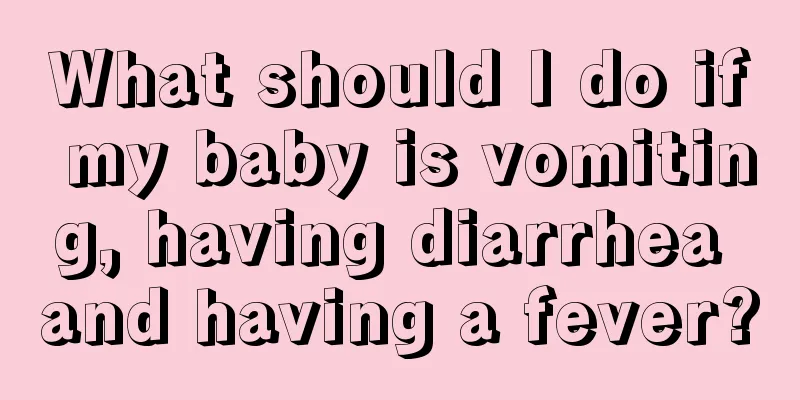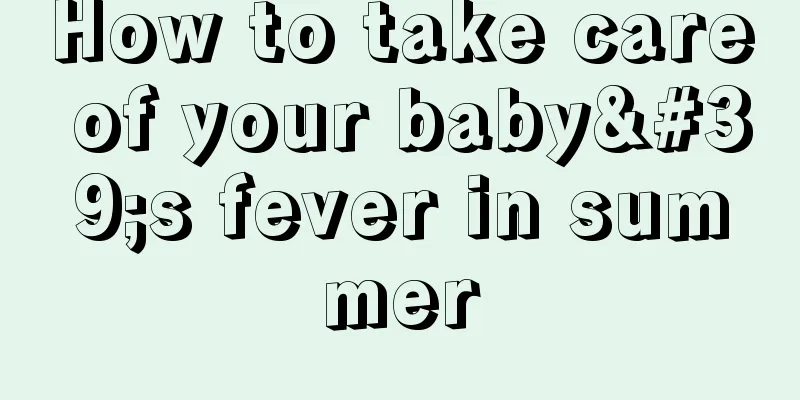What should I do if my baby is vomiting, having diarrhea and having a fever?

|
It is a common situation for babies to vomit, have diarrhea and have a fever. This situation is mostly caused by viral diarrhea, which has a lot to do with the baby's diet. This situation has a great impact on the baby's body, so parents need to understand it in detail and take some measures to treat it. So here is what to do if the baby vomits, has diarrhea and has a fever? Viral enteritis, also known as viral diarrhea, is a group of acute intestinal infectious diseases caused by a variety of viruses. The clinical characteristics are acute onset, nausea, vomiting, abdominal pain, diarrhea, watery or loose stools, and may also be accompanied by fever and general discomfort. The course of the disease is short and the mortality rate is low. The clinical manifestations of gastroenteritis caused by various viruses are basically similar. There are many types of viruses associated with acute gastroenteritis, among which the more important and most studied are rotavirus and Norwalk virus. In addition, calicivirus, enteric adenovirus, astrovirus, coxsackievirus, coronavirus, etc. can also cause gastroenteritis. Treating a disease requires a process, don't be impatient. Continue treatment according to the hospital's plan.Baby's gastrointestinal care: 1. Correctly adding complementary foods is the key The taste buds of newborn babies are not yet developed. It is not until they are exposed to various flavors that their sense of taste begins to develop. The quality of taste development has an important impact on the baby's appetite. Therefore, whether the mother can add complementary food to the baby in time and reasonably after the baby is 4 months old is very important for cultivating good gastrointestinal function.
When babies are 5 months old, they will drool when they smell the food cooked by adults, which means that they are no longer satisfied with their "diet" of only milk. They strongly demand to eat a variety of foods and have a strong demand for the "taste" of solid food because they need to grind their teeth. If they can't get food, babies will grab everything they come across and put it in their mouths. In fact, their requests are very simple: "I just want to taste it, chew it, and make my itchy gums feel better." At this time, the baby's gastrointestinal tract is also ready to welcome solid food. Therefore, parents should add solid food to their babies in a timely and bold manner. Moreover, the rougher the food is, the greater the mechanical stimulation to the baby's mouth and gastrointestinal walls, and the greater the driving force of the intestinal wall muscles. This is how you can train your baby's digestive tract to have a strong driving force and help your child have a good stomach.
The preparation of food must be suitable for the baby's age characteristics. For example, the baby's digestive ability is still relatively weak after weaning, so the food should be cooked finely, softly and thoroughly. As the baby grows older, the chewing ability of the baby increases, and the food processing gradually tends to be coarse and complete. In addition, the color and taste of food are also very important. Babies are usually very picky about food. Regardless of the taste, they will refuse a dish if it is not cooked properly. For example, not liking to eat vegetables is a "common problem" among many babies. At this time, the mother can use her brains and try changing the way of eating them, such as chopping vegetables into porridge or rice, or making vegetable and meat fillings for dumplings or wontons, and the baby will like to eat them. The food should also be diversified, with meat, poultry, fish and eggs every day to ensure that the baby's nutritional needs are met as much as possible. Unless the diet is supplemented or fortified with nutrients, a vegetable-only diet will not meet the nutritional needs of babies at this age. |
<<: Why do babies often have fever?
>>: What should I do if my seven-month-old baby has a fever of 38 degrees?
Recommend
How long should babies be exposed to the sun?
How long should babies bask in the sun? I hope yo...
Children's dietary health knowledge
Many parents may not be so clear about the dietar...
What to do if your child has protruding ears
If a child has protruding ears, it will not only ...
Causes of black face in newborns
Ladies who have just become mothers will definite...
Why do children like to rub their eyes?
Careful parents will find that many babies rub th...
What to do with exfoliative dermatitis in children?
Dermatitis has always been a difficult skin disea...
What to do if your 2-year-old baby cries at night
Babies cannot establish their own circle and livi...
Nursing methods for 20-day-old baby spitting up milk
Nowadays, every family has only one child, who is...
10 Foods That Can Cause Choking in Children
Choking is listed as one of the leading causes of...
How to breastfeed twins
Every child needs careful care to grow up healthy...
What to do if the baby chokes and milk comes out of the nose
In the process of taking care of the baby, no mat...
What is the reason for children grinding their teeth at night?
When children are in the teething stage, or in no...
What are the symptoms of a baby not eating enough?
When parents are feeding their babies, they are w...
My baby has a low fever of 37.5 degrees. What's going on?
Low-grade fever refers to a body temperature betw...
Swimming pools are prone to pink eye in hot weather. Four aspects of pink eye care for babies
Right now, the weather is hot, and more people ar...









